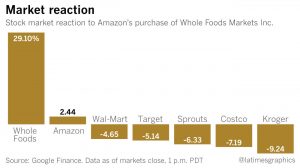After Amazon’s notable purchase of Whole Foods both businesses have been under scrutiny regarding sustainability. A lot of questions have circulated around Amazon’s motivation for purchasing”America’s healthiest grocery store,” and many customers are concerned the product line may not remain as “pure” as it once was.

While I myself believe that Amazon is using this acquisition as a way to “green” their image, I realized I have no idea what Amazon is currently doing in regards to sustainability. I did some research, and here is what I found:
Amazon’s environmental dedication is focused on power.
Amazon has signed the White House’s Business Act on Climate Pledge and joined Apple, Microsoft and Google in supporting the continued implementation of the U.S. Environmental Protection Agency’s Clean Power Plan.
Amazon’s newest buildings are heated using recycled energy.
There are initiatives in place to encourage box reuse and reduction in packaging supplies overall.
Amazon has set a goal to install solar energy systems at 50 of their fulfilment network buildings by 2020.
Amazon Web Services (AWS) exceeded it’s goal of using 40% renewable energy by 2016, and is looking to reach 50% by 2017.
I felt that the final two discoveries were a bit difficult to comprehend, as an “outsider” I have no idea how many fulfilment network buildings there are, or how big AWS is in regards to Amazon as a whole. It turns out, Amazon has 475 fulfilment buildings globally, and about 47 more are expected in the future. This means that less than 11% of the buildings are going to be solar powered by 2020.
It is much more difficult to understand the impacts of AWS using 100% renewable energy on Amazon’s overall environmental footprint. I was unable to find information regarding how much power Amazon uses as a whole, or how much AWS as a segment uses. Therefore, all I can say is that Amazon is committed to using renewable energy for a fraction of it’s operations.
Based on this information, I can say with certainty that Amazon is taking some initiative regarding the environmental, economic and social realms of sustainability, which is promising. That being said, I don’t feel that they are doing enough, especially considering how powerful and innovative Amazon is. Looking at the top ten companies owned by Amazon (found on investopia.com) Whole Foods is the only one that I easily identify as a “sustainable” company. This reassures me in my assumption that Amazon’s acquisition of Whole Foods was done primarily to contribute to their own environmentally friendly image.
Now I wonder, will Whole Foods make Amazon seem more “green,” or will Amazon harm Whole Foods’ prestige in the sustainability department?

Information
http://www.mwpvl.com/html/amazon_com.html
https://www.amazon.com/p/feature/gkkwdp34z5ou7ug
http://www.investopedia.com/articles/markets/102115/top-10-companies-owned-amazon.asp
Images
https://www.google.ca/search?q=whole+foods+and+amazon&source=lnms&tbm=isch&sa=X&ved=0ahUKEwir5sDwmfHWAhUM8GMKHVc0CLcQ_AUICygC&biw=1301&bih=639#imgrc=fEEHZ5njivdpMM:
https://www.google.ca/search?q=whole+foods+and+amazon&source=lnms&tbm=isch&sa=X&ved=0ahUKEwir5sDwmfHWAhUM8GMKHVc0CLcQ_AUICygC&biw=1301&bih=639#imgrc=pDe3RRm2FNUfEM:
Thanks Carissa,
I really think you hit the nail on the head – Amazon is looking for power more than anything – scary to think that sustainability is now one more playing field for power! Although I guess the silver lining is that sustainability is important enough to be thrust into the spot light…
Your posts are a joy to read. Very insightful, and a great combination of things we can do as individuals and larger problems society will have to deal with. My one suggestion would be to consider included hyperlinks right into your text – let your classmates follow some of your background links!
Looking forward to reading more!
Tess
Hello Carissa,
Another great blog! Thanks for sharing, great insight. I was curious about what Amazon is doing about sustainability but didn’t get a chance to actually do research.
It’s great to see that companies are taking the time and money to invest in sustainability initiatives. But sceptical side of me think, they don’t really care about the issue and they are in it for the money. Maybe they have no choice in the matter as they don’t want to be laggards in today’s changing marketplace. I believe that this is the case, which makes it very hard to trust any of these big companies when they say they are trying to be sustainable. It always comes down to the same discussion. How can we say a company is sustainable or ‘green’, when only one or two of its brands/products lines are green or sustainable out of tens or hundreds of unsustainable products lines or brands? 50 buildings out of 475. Congratulations to Amazon for making a tenth of its operations kind of sustainable.